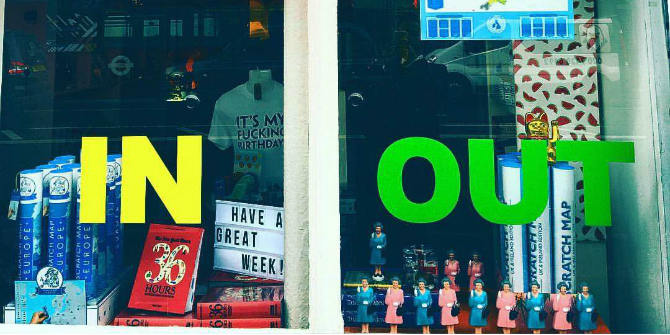The negativity of the EU Referendum campaign undermines democracy

Image via LSE Brexitvote Blog
Referenda, along with other forms of direct democracy, are seen as an important element of democratic decision-making. They give a voice to the people in key constitutional issues, bringing decision-making to the citizens. Sara Hobolt notes that they have been increasingly used at key moments in European integration, seen as one way to improve EU democracy. Back in 2009 and 2010, the pro-European Liberal Democrats were calling for a referendum on EU membership to ‘settle the arguments’ once and for all, to have an open debate about the pros and cons of membership. So far, the referendum debate is not living up to these democratic ideals.
While Vote Leave has accused David Cameron of running Project Fear, both sides have focused heavily on negative, fear-based arguments to make their case –‘Project Fear meets Project Fear’. Fear has long been used as a strategy of negative campaigning. But the fear stories used by both sides of the campaign and in the media prevent democratic engagement with the arguments, create divisions, and foster political cynicism.
Matthew Goodwin shows how the most important issues in the campaign have become migration and the economy. Vote Leave use identity-based arguments that turn migrants into a common enemy. The stories focus on the pressure on public services, particularly the NHS, from an impending ‘surge’ in migration – threatening the institution that lies at the heart of post-war British identity. These stories also have clear Islamophobic undertones. The campaign recently argued that remaining in the EU would allow free movement to millions of Turks, which would increase crime and jeopardise national security. These claims stigmatise not just Turkish people already in the UK, but also Muslims in general. Just this weekend, Nigel Farage claimed that staying in the EU would mean that ‘British women will be at risk of mass sex attacks by gangs of migrants’.
Anti-German sentiment also plays a role. Boris Johnson has publicly compared the EU’s goals to those of Hitler, drawing on long-standing discourses that still present British-European relations through the prism of war. This kind of anti-German rhetoric has long formed part of Britain’s media discourse on Europe and presents voters with a threat of fascism that simply is not there.
In turn, the Remain camp mostly eschews notions of a positive role for Europe in Britain’s national identity. Instead, they have focused on fear-based economic arguments, warning of an imminent economic disaster. Recent predictions have included a cost of £4,300 a year for every household, wage drop of £38 a week, the loss of 100,000 manufacturing jobs, a 10-18% drop in house prices and highermortgage rates, two more years of austerity, an increase of £230 on the average family holiday, loss ofwomen’s rights, an ‘instant DIY recession’ and 500,000 more unemployed, amongst others.
Instead of primarily highlighting the benefits of EU membership, or indeed positioning Britain as a European country that should work together with its European neighbours, the Remain campaign is, in this way, seeking to scare British citizens away from a Leave vote. Instead of encouraging people to think about the positives and benefits of European integration, it is hoped that fear of the unknown, fear of our own economic futures, will take control on 23rd June.
On the one hand, this is the only way that Brits can discuss the EU. As Oliver Daddow has recently argued, Project Fear is the legacy of decades of British Euroscepticism. For Eurosceptics, the EU has always posed a ‘threat’ to Britain, it has always been the ‘enemy’. Because of this, pro-Europeans in Britain have always focused on the economic arguments to make the case for membership. In one way, these arguments serve to make Europe resonate with the public. In a referendum campaign, messages about the EU need to make sense. As Anand Menon has noted, emotions matter in politics. The campaigns are, of course, seeking to gain support, and studies show that negative framing encourages support for the party or solutions being proposed. Fear stories might be the easiest way of raising awareness of the referendum.
On the other hand, studies of media effects show that fear-based messages immobilise people in the face of risk. This kind of negativity can also lead to a ‘negativity inversion’ effect, leading to positive support for the proposed solutions. While they might encourage support for the arguments put forward for and against EU membership and make people aware of the key issues, they also risk inhibiting critical engagement and reflection. Fear is used to prevent citizens from evaluating the facts, weighing up the evidence, thinking about the issues.
Negative news also promotes political cynicism. News that portrays politics as a matter of party strategy gives the impression that politicians prioritise self-interest over the common good. This in turn leads people to lose trust in politicians. Governments often call referenda out of strategic considerations. The referendum was called to overcome internal divisions in the Conservative Party, and Vote Leave figurehead Boris Johnson is widely seen to be using the campaign as a pre-emptive bid for leadership of the Conservative Party. Recently, there have been public calls for David Cameron’s resignation. On the Labour side, Jeremy Corbyn’s refusal to share a platform with David Cameron as part of the Remain campaign also reduces the campaign to party political posturing.
All this will likely exacerbate political cynicism. Compared with an EU average of 43%, 73% of Brits distrust the press. Distrust in politicians has also been found to be a significant driver of support for UKIP, meaning that an increase in cynicism will likely further entrench their support, regardless of the outcome of the referendum. And it is not just party politics – the campaign has already resulted in accusations of bias towards our official institutions such as the Bank of England.
Alongside the potential effects of fear-based messages, the referendum campaign has failed the democratic test on many other accounts. The effect of negative campaigning has been found to bemediated by existing attitudes as well as political knowledge. But we know that British people are the least knowledgeable about the EU, which, in turn, is likely to depress turnout. Although a number of organisations, such as Full Fact and KCL’s the UK in a Changing Europe, are fact-checking the campaigns’ claims, helping to dispel the myths, and organisations such as Bite the Ballot are encouraging debate amongst young people, the arguments on both sides have been categorised by misleading and factually inaccurate claims.
We have also seen that the debate is non-inclusive, with an absence of minorities and female experts in the campaign. A recent study by the Loughborough University found that 91% of voices in the press coverage of the referendum are men. All this limits the kinds of information and arguments available to the public. Social media debates also seem to be dominated by the Leave campaign, raising questions about the extent to which people in favour of EU membership are participating in public discussion.
Whatever happens on June 23rd, the campaign should be remembered as one that raises serious questions about the extent to which referenda can engage citizens in democracy and encourage open debate about the issues – in this case, the pros and cons of British membership of the European Union.
—
Note: this post originally appeared on the LSE BrexitVote blog. It represents the views of the author and not those of Democratic Audit or the LSE. Please read our comments policy before posting.
—
 Charlotte Galpin is a British postdoctoral researcher at the University of Copenhagen, and has research interests in European identities, Euroscepticism, European public sphere and EU democracy. She is currently completing her book, The Euro Crisis and European Identities: Political and Media Discourse in Germany, Ireland and Poland, to be published with Palgrave Macmillan.
Charlotte Galpin is a British postdoctoral researcher at the University of Copenhagen, and has research interests in European identities, Euroscepticism, European public sphere and EU democracy. She is currently completing her book, The Euro Crisis and European Identities: Political and Media Discourse in Germany, Ireland and Poland, to be published with Palgrave Macmillan.





 Democratic Audit's core funding is provided by the Joseph Rowntree Charitable Trust. Additional funding is provided by the London School of Economics.
Democratic Audit's core funding is provided by the Joseph Rowntree Charitable Trust. Additional funding is provided by the London School of Economics.
The negativity of the EU Referendum campaign undermines democracy: https://t.co/XtYWGHGR2i
The negativity of the EU Referendum campaign undermines democracy https://t.co/5ocgYJyhM9
The negativity of the EU Referendum campaign undermines democracy #TurnUp https://t.co/xBive8xrJw https://t.co/uAzSVfJDFO
[…] The referendum debate is not living up to its democratic ideals. Both sides of the divide have focused heavily on negative, fear-based arguments to make their case, which prevent democratic engagement among the electorate. […]
The negativity of the #EURef campaign undermines #democracy https://t.co/GIZeQemnNM #StrongerIn #VoteLeave
The negativity of the EU Referendum campaign undermines democracy https://t.co/5cBmemMOdb
These trends apply not only to the EU referendum. They occurred also
with the AV referendum re use of the Alternative Vote. In the autumn
of 2010 there was a broad parity of opinion but by April 2011 it had
been transformed into a referendum on the merits of Nick Clegg (by
that time tarnished by the student fees issues).
The message seems to be – avoid a referendum if at all possible. The
UK did this until 1975 and then the Blair government ushered in a
series of them that would make it difficult to reverse the culture.
Rather belatedly there is a campaign for a “Better Referendum”.
In any future case, the legislation should allocate funds also to
such a group – required to avoid the merits of the issues but also
required to highlight the facts. Possibly a mass-circulation leaflet
a week before a poll can assist with undoing some of the fear
tactics advanced by the tendentious campaigns. Too late for
this time but would ten million pounds be too much to uphold
democracy in a future referendum?
Research shows chance of negative ref.campaign is highest when international issue. #Brexit is nice illustration: https://t.co/lP9VTgk2Gm
The negativity of the EU Referendum campaign undermines democracy https://t.co/WOYOwi0cfa https://t.co/cWWq2Dlpje